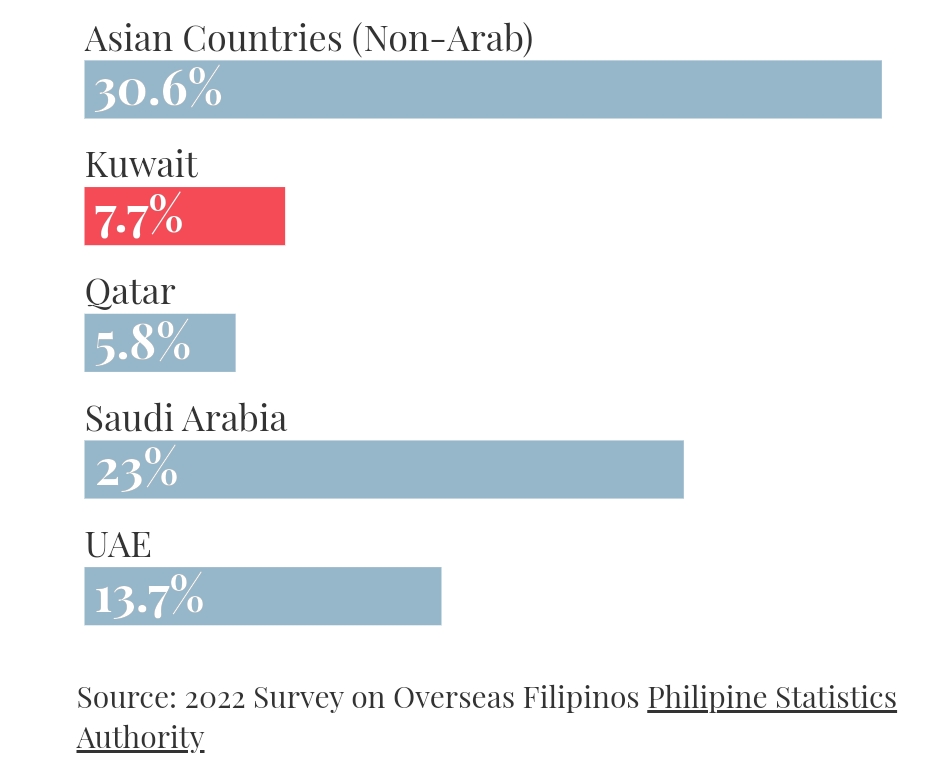Kuwait and the Philippines have reached an agreement to lift the Gulf state’s ban on accepting workers from the East Asian country and resume issuing tourist and work visas to Filipinos.

The move comes after a years-long diplomatic crisis over labor rights.
The latest agreement allows for the hiring of only experienced domestic workers and those who have previously worked abroad.
Kuwait suspended all new visas for Filipino nationals last year after relations deteriorated following the murder of domestic worker Julebi Ranara. After her death, the Philippines banned first-time workers, particularly domestic helpers, from being sent to Kuwait.
The latest bilateral agreement was announced on Monday by First Deputy Prime Minister, Secretary of Defense and Secretary of the Interior Sheikh Fahad Yousuf Al Sabah after a meeting with Philippine Overseas Employment Administration (Poea) Administrator Bernard Olalia to resolve the issue.
“The two countries agreed to set up a Joint Technical Working Committee composed of relevant authorities from both countries to meet regularly to discuss labor issues and other pending issues that may arise in the future,” the Department of Interior said in a statement. The Philippine Embassy in Kuwait said in a statement to The National that it welcomed the lifting of the visa ban on Filipino nationals.

“The Embassy looks forward to deepening bilateral relations between the two countries through upcoming meetings and discussions so that outstanding labor law issues and concerns can be resolved to the satisfaction of both countries and the mutual benefit of employees and employers to be addressed and resolved,” said Ambassador Jose A. Cabrera III.
The Philippines and Kuwait signed a labor agreement in 2018 regulating the work of domestic workers. The dispute between the two countries led to a two-month diplomatic crisis after another domestic worker, Joanna Demafelis, was found murdered and dead in a freezer.
Last February, the Philippines banned its first domestic workers from being sent to Kuwait in protest of the murder of Ranara, whose body was found burned in the desert. An autopsy performed by Kuwaiti authorities found that she was pregnant at the time of her death. Her employer’s 17-year-old son was sentenced to 16 years in prison as a minor.

Ranara’s murder came almost five years after the murder of Filipina domestic worker Joanna Demafelis. Joanna Demafelis was murdered by her employer and her body was found in a freezer.
This sparked a diplomatic standoff, leading then-President Rodrigo Duterte to impose a temporary ban on workers from the Philippines entering the Gulf state.
Both killings prompted the Philippine government to review the 2018 agreement.
In 2018, Kuwait said two Philippine embassy officials who appeared in a viral video “rescuing” a Filipino domestic worker “encouraged female domestic workers of the same nationality to flee their employers’ homes.”
The review of the agreement angered the then-Kuwaiti government, which called on the Philippine government to “respect its sovereignty.”
Kuwait also cited nine actions by the Philippine embassy that it said violated the bilateral labor agreement, including having workers stay in private residences and accommodations associated with the embassy.
Kuwait is home to about 270,000 Filipinos, many of whom work as domestic helpers. They make up 7 percent of the total overseas Filipino workers (OFWs), most of whom work in Gulf countries such as the United Arab Emirates and Saudi Arabia.
Of the estimated 1.96 million OFWs in 2022, 1.13 million (57.8 percent) were women, according to the Philippine Statistics Authority.
According to the Bangko Sentral ng Pilipinas, personal remittances from overseas Filipinos reached a record high last year due to an increase in overseas workers. Personal remittances from overseas Filipino workers (Overseas Filipino Workers) were $37.2 billion in 2023, up 3 percent from $36.1 billion in 2022, according to central bank data.

